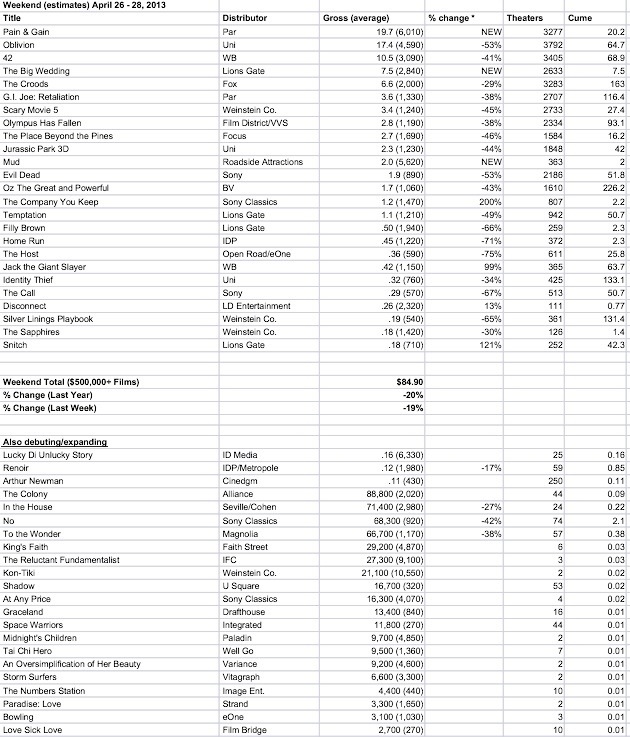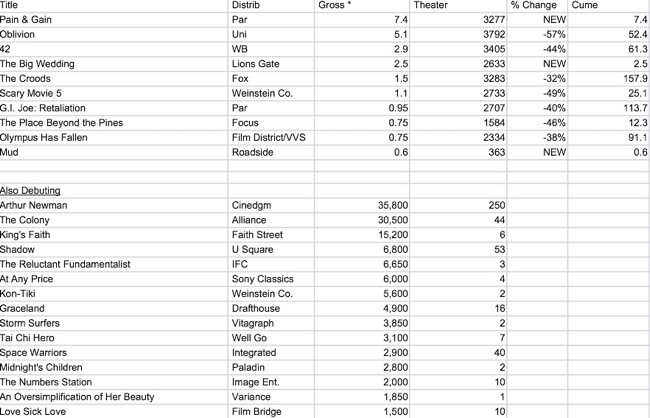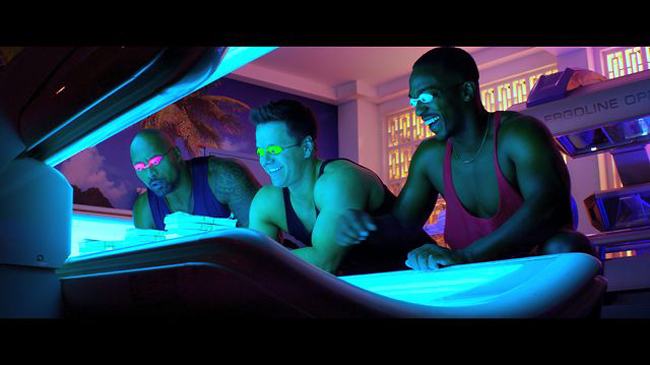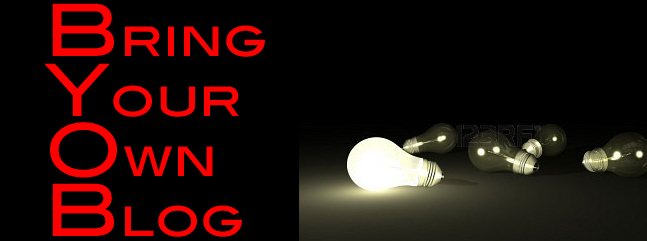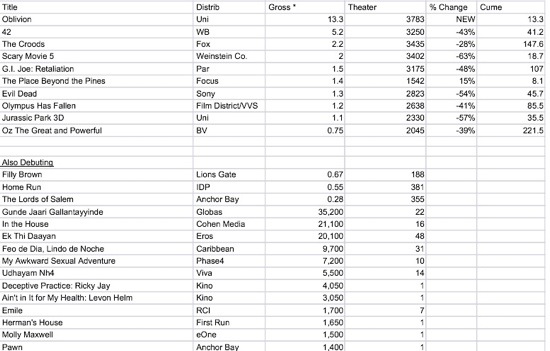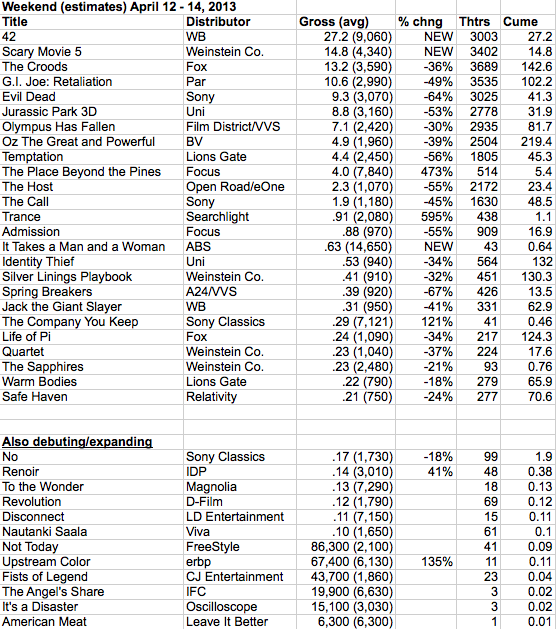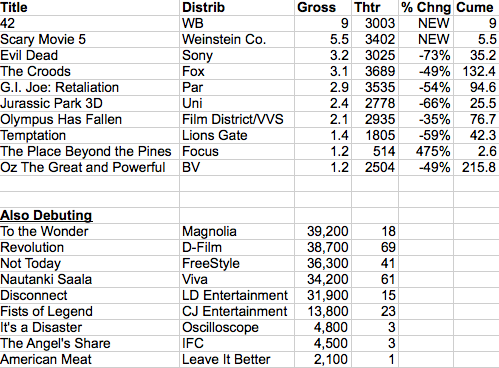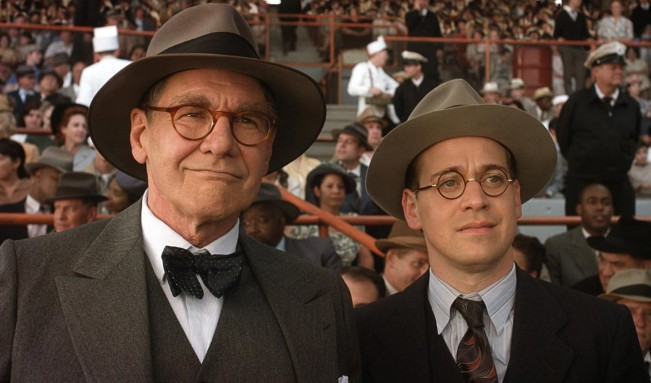The Hot Blog Archive for April, 2013
Weekend Estimates by Pain & Klad
Sorry for the non-analysis… in NYC working. I’ll write more if I have some time… but yes, the P&G opening, while the movie will end up being profitable, pretty much sucks. And Universal & WB should be pretty pleased with their holds.
45 Comments »Review: Pain & Gain (98% spoiler-free)
I have come to like and admire Michael Bay. He knows who he is as a filmmaker and he does magic tricks that no one else can do.
Does he make great films?
Hasn’t yet.
But he makes very consumable stuff. And there is often real beauty in his high-voltage, high-gloss, smoke and pastel.
Pain & Gain is an attempt at “edgy” and “so dumb it’s intelligent.” And I was rooting for the film to be great and great fun from weeks before I took a seat in the theater it screened in until the end of the film. I opened myself all the way up to every wild idea – however based on truth – and crazy visual in the movie. I love Tony Shalhoub and he was, in many ways, reprising his Men in Black performance – which I loved – here. I’ll take all the Rebel Wilson they can give me. Mark Wahlberg has become a truly great everyman actor. Have always enjoyed The Rock, whatever he was cooking. And Anthony Mackie is always terrific… not sure how he bulked up this much.
So why isn’t the movie great? Or more pointedly… why doesn’t it work?
I feel I should write, “Michael Bay,” but it isn’t a matter of putting this on Bay’s doorstep. His skill set was used and used well. But what was missing was a mad artist. What was missing was an editor who could chop off long, repetitive sections of the film. The film needed shaping from a mind that is as good at leaving things out as putting things in.
Pain & Gain collapses under the weight of its repetition of cool shit. It is a collage that never becomes a full picture.
The comparison that was dead clear to me during the movie was the late, great Tony Scott’s Domino. There is a lot of stuff I LOVE in that movie. Keira Knightley completely got me in that movie. Her romance with Edgar Ramirez gave the comedy some soft romantic edge… one that is completely absent in P&G, though there is a nod to it in the Mackie/Wilson connection. Much of the screaming in the film was fun. The stunts were often insane. Mo’Nique was a glorious racist caricature. (We can get into the fight about whether such a thing exists later.) Rourke was still close enough to this side of the crazy tracks that he was interesting and not a cartoon.
But P&G doesn’t know when to stop. It loves too much of a good thing, a bad thing… really, everything. The first act is fun… until it becomes a Russian novel as read aloud by an idiot.
A classic problem with this film… Dwayne Johnson is quite good in the movie as a 12-stepping, Jesus-loving thug. But (SPOILER… KINDA) when he falls off the wagon, the movie is so busy playing peek-a-boo with Bar Paly’s also-could-have-been-a-star-making-turn Euro-bimbo that it forgets to slow down and make a strong play with the fall of Paul (Rock). This character should have been Oscar bait. He has so many bizarre turns and twists, and Johnson seems absolutely up to the role… but the movie deserts him. There is a bit – which I won’t spoil – in the third act, where this Jesus-guy ends up doing something so outrageous that it gets a big audience laugh… but the movie has neither the time or inclination to slow down and engage with this character as he makes this choice. And there is the difference between Tarantino and an Oscar for Mr. Waltz and Pain & Gain.
Michael Bay has the brain, camera skills, and balls to make this movie a tough as it can be. But he doesn’t have the inclination to slow down and trust the drama.
At 1:40, this would have been a tight little romp of a movie. I’m not sure it would have ever been great, unless they brought in a guy like George Armitage, whose Miami Blues is, in many ways, the indie version of this film. But it’s not… it’s better. Because Alec Baldwin and Jennifer Jason-Leigh and Fred Ward were special effects enough.
P&G keeps telling us that this is a true story no matter how unbelievable. And it’s a very funny, quirky, crazy story. But it is missing the “Why?” and that is where the soul lives. The closest it gets is Mackie and Wilson, but even that is given too-short shrift.
You know who I loved in the film? (That is, beyond Larry Hankin’s cameo.) Emily Rutherfurd. She plays Mrs. DuBois, wife of Ed Harris’ character. When she in on camera, everything seems to slow down for a normal human emotion… some of the only times in the film.
Anyway…
I was still entertained often by Pain & Gain. A lot of the material is very broad and silly… Three Stooges with buff bods, tans, and epic skies. But I was willing to go there.
What hurt – so much – was that we, as an audience, know a lot about Wahlberg’s character within moments of meeting him. Not only do we get his mindset – the nicely faked “be rich like me, idiots” ads and seminars help – but we know what a screw-up he is, how much smarter he thinks he is than he is, and how distracted from enjoying what he worked so hard for… all clear in an instant. Gotta give Bay and Wahlberg a lot of credit for that. But then, the movie can’t stop telling us what we already know, over and over and over again until it stops being fun and becomes a bit of a chore.
True Romance is probably the best of this small, but distinct genre in post-1980 cinema. And we hoped for a return to that from Domino. And we hoped for it again here. Nope. Too much testosterone.
14 Comments »Ed Douglas Fundraising
Ed Douglas has friends and friendly foes across the web. But that takes a backseat to health issues, as Ed has been diagnosed with acute leukemia and has no insurance.
Others in this community have chosen to keep this kind of thing quiet. But in light of Ed’s willingness to seek help from the community, the least I can do is to pass the word along and offer an opportunity for anyone who reads The Hot Blog who wishes to help financially to do so.
And just FYI… if anyone comments here in any negative way about Ed, I am going to pull the comment. If you want to criticize my choice to post this, I won’t touch it. But I have no intentions of allowing this to become a place to kick a guy for sport when he is down.
4 Comments »10 Fallacies About Netflix, As Presented By Rich Greenfield
I like Netflix.
I believe Netflix will be a business well into the next decade.
But I believe that the media and certain analysts get aroused by Netflix in ways that have little to do with reality.
Rich Greenfield, who is this period’s great analyst/self-promoter came out with Netflix as a “Buy” yesterday (free subscription needed), part of a media circle jerk (including one of the rare weakly-reported, “I read someone else opine about this, I basically agree, and I’m passing it along with the NYT logo on it” columns by David Carr). Greenfield was quoted by way of another outlet quoting Greenfield, so I went to the source and these are the arguments that I do not feel hold up as factually accurate.
1. “The more a subscriber streams daily, the lower churn should fall.” – This is as silly as 99% of the decoding of individual behavior based on broad, undetailed stats. The comment makes sense, out of context. But the lack of context for the presumption in the statement, that subscribers are streaming quite a bit daily, is a big problem.
Greenfield is worked up about the stat, released by Netflix, that the site has streamed 4 billion hours of content in the last 3 months. Greenfield got out his calculator and surmised that “Netflix now has an estimated 29 million US streaming subscribers (households), utilizing the service for more than 87 mins per day.”
Multiple issues. First, of the “estimated 29 million US stream subscribers” about 2 million are free subscriptions, presumably more during the last quarter after the heavy push to get people to watch episodes of House of Cards “for free” and all the attention to binge viewing. Very few people seem to pay attention to the “paid subscribers” vs “total subscribers” issue in reporting the highest possible number of Netflix subs.
Second, the presumption that 29 million subscribers are spending 87 minutes per day on Netflix is, obviously, inaccurate. Experiential indications are that there are subscribers who watch Netflix occasional, if at all, in any given month, and those who watch it quite a lot (especially cord cutters). And as mentioned before, a lot of free hours were given away specifically for House of Cards.
Third, by speculating with such gusto, Greenfield – and others – essentially manufactures the false idea of insight into what the stats inside of Netflix’s viewer habit really are. He has none that Netflix has not given us. None of us do. This doesn’t mean they are lying, but it should be a big red flag when contextualizing this info in terms of the broader industry.
2. “With device manufactures, ISPs, talent, and content creators/programmers all rooting for Netflix’s success, in fact it is now hard to find anyone who does not want Netflix to succeed.”
Again, this is rooting, not analysis. A few studios are taking long, deep pulls off the Netflix teet. The vast majority are not. This is not to say that they want Netflix to fail. But Netflix is a means to an end for the industry. It is not a hero… outside of its willingness to overpay for content, setting the market value at 30x or more what it was 3.5 years ago. Nor is it the enemy, which was the stupid media spin of a couple years ago.
Netflix is a buyer. Netflix is a leader in a streaming market what will grow exponentially in the next decade. But Netflix owns (almost) nothing, which makes them vulnerable to content pricing issues and competition from both new content bundlers and the content providers themselves. As soon as content providers feel there is a way to equal or surpass the amounts that Netflix is paying for content, the dynamic will shift in a hurry.
3. “HBO costs us $180/year ($15/month), but we probably only watch four series each year plus several documentaries/original movies.”
I guess the “us” excuses a specific number that varies wildly from one cable/satellite provider to the next. The assumption, again, that Mr. Greenfield knows what people watch or don’t watch on HBO (and its many branch channels) each year is wild, to say the least.
But it is, once again, a pretty clear show of pro-Netflix bias that clouds any serious conversation about the company’s future.
4. “While it is far too early to call Netflix’s original programming push a success, they are trying to reach a point where consumers know that there will always be something new and interesting coming that requires a Netflix subscription, in addition to top tier syndicated programming and a sufficient movie selection.”
Yes, that is one thing that Netflix is trying to do. At least, for now, without a single exclusive streaming deal with a major studio and 2 years to wait for Disney to kick in. Greenfield is trying to assert the strength of the original programming push, but damns Netflix overall with faint praise.
In some regards, the streaming libraries of Netflix’s competitors are already quite competitive. And in terms of filling the gap with content that is sold or rented by unit, both Amazon and Apple’s iTunes are well ahead (given that Netflix doesn’t compete on that turf). But as the players evolve on price point, and on the indie side, VOD becomes more the standard, this will become a bigger strain on Netflix.
5. “Content Leverage Coming In the early stages of streaming, Netflix needed to license whatever content they could get their hands on. Content owners were able to sell old content at incredible prices – but Netflix was desperate and bought everything they could find. As Netflix streaming has matured, with the company launching original programming and having lined up a Disney movie output deal starting in 2015, we expect Netflix will be able to exert far more control over its programming investments for 2014 and beyond (they will either get fresher content or pay less/give up content they currently license).”
I took the whole paragraph on this one, as you can see, because the whole thing is just so ass backwards. It assumes, like so much writing on Netflix does, that Netflix is smarter than the content providers and are, somehow, critical to the future of said content providers.
To start, when Netflix started streaming, it wasn’t Netflix that desperately took whatever it could get… it was the content providers, who took very little money to stream. After all, it was truly an emerging delivery system. And the content providers were thrilled, especially in light of the collapse of the DVD market, to take what Netflix offered.
And by the way, this is in a market with reduced competition, as pay-TV lowered its priority and spends on feature films as well, completely coincidentally. So a deal like STARZ, which brought two studios along with it, meant studios got paid more for their pay-TV deal with little exposure from the early days of streaming.
A few years later, the worm turned. And yes, when Netflix went into the market and was suddenly (shockingly) willing to spend $100m a year per studio, they ended up settling for smaller fish. They lost the big fish they had. And that hasn’t changed. EPIX, which brought Netflix Paramount and Lionsgate product, was a non-exclusive deal. Relativity, Weinstein, etc.. not majors.
So then Netflix adjust its spend to allow for a $350m a year buy of Disney product for five years. It should be good for Netflix and great for Disney. But what else will come? Will Netflix be able to afford an exclusive with another major studio? And with Netflix already allowing smaller content deals to drop every month, how much more content will Netflix lose if they want to spend, say, another $250 million a year on another studio?
If by “assert control,” Greenfield means “give up,” his analysis is correct… though it is already happening and has nothing to do with being in control, but simply being able to afford content.
Greenfield, like others, seems to think that Netflix will somehow become “more than a buyer” at some point. But there is no such thing in this marketplace. No content provider gets an advantage by being more widely viewed. It is the opposite in a model that is not like the conventional television series universe. If A will pay $100m and 25 million people will see the content and B will pay the same $100m but only 1 million people will see the content, the content will be more valuable when the deal with B is over, as it has been underexploited and still has value as “relatively new” content without the stigma of a ratings failure, as streaming networks have no ratings as such.
6. “Netflix Set-Top Box Integration While Netflix has done a great job making their app available on every device capable of streaming video, using Netflix generally requires changing HDMI inputs on your TV. The big opportunity is when Netflix is seamlessly integrated into the TV experience. Two recent examples point to where the video world is going: (1) Google Fiber which has Netflix integrated and (2) the Time Warner Cable Roku app. As TV simply becomes an app like Time Warner Cable on a Roku, it becomes much easier for consumers to shift between live TV and on-demand TV such as Netflix (just switch quickly between two apps, without HDMI switching). The more cable “unboxes” itself, the easier it will be for consumers to access Netflix.”
This is true on its face… but feigning ignorance in terms of context. Hulu Plus is already on equal footing with Netflix in placing its app on devices both on and off TVs. Amazon Plus is right behind it. And HBO Go is slowly expanding. So will every other competitor in the field.
Two years ago, Netflix had a massive advantage in this regard. That advantage is near fully spent… especially as regards Roku, which is not just making room for all competition to Netflix, but it almost reckless in the number of channels it is making available to streamers. The days in which Netflix could leverage its power and be the only app on a blu-ray player or streaming device or set-top box moving forward are over. Consumers will not accept being told that they only have one choice.
7. “with Netflix greatly improving the service’s content and user experience” – I’ve been over this before, but month by month, Netflix is offering less and less content while competitors have improved their user experience. Netflix is still, pretty much, the best… but more competition is coming and this technology is not proprietary.
PS3 is now experimenting, for instance, with the Laugh Factory channel, which is meant to offer nightly live comedy shows from the stage of one of Los Angeles’ prime comedy clubs.
MLB.TV is about the same annual price as Netflix for all of the baseball season, including most live games, all radio broadcasts, and various added features, streaming to your TV and portable devices.
The NFL is still being paid more by DirecTV than they can make by opening up the market, but their packaging and streaming of the entire NFL line-up each weekend is excellent and integrated.
There is nothing bad about Netflix. But they are no longer the one star shining above all. That’s just not what the territory looks like.
8. “Netflix is able to reach 40 mm US streaming subscribers by 2015.” Seriously?
The big play for Netflix is Disney. Can Disney product drive 5 million – 10 million new Netflix subscribers. That’s what Netflix needs to find out. That’s what Disney needs to find out.
But there is no history that suggests that there is a streaming market out there to expand Netflix by more than 1/3 of its existing subscriber base in the next two years. Disney could change that. All the studios are hoping it will, because the future is going to rely on a redefinition of bundling that has subscription rates in the 70m+ range… more like cable/satellite subscription levels.
9. “Increased competition from TV Everywhere initiatives and over-the-top broadband streaming providers (such as Amazon Prime)… we no longer believe it matters as much as we thought, as there appears to be plenty of room for more than one consumer streaming service.”
That’s a bit schizophrenic, no? Greenfield doesn’t believe the competition matters so much any more AND there’s room for more than one streaming service.
And 3 years ago, Netflix was a completely different business.
I don’t really think that Amazon is the Netflix-killer it was made out to be. But 4 or 5 studios that are not in the streaming business with Netflix? That’s where the real competition is. The content providers have been freed and they really haven’t shown their hand yet… mostly because they haven’t made the technology side work right. But they will. It will take too long and cost too much, but they will certainly catch up with Netflix. And when they do, there is a tsunami coming… not of gimmicks, but of content… so much content that it fills every niche.
That is why I believe that a healthy Netflix will be purchased by 2020… because the content issues will overwhelm their business, not too much unlike the way Netflix overwhelmed Blockbuster and the remaining mom & pop DVD/video stores.
10. “Netflix bears point to the company’s significant content commitments being too large and fear that they will eventually be forced into bankruptcy. However, we feel that Netflix’s future content commitments are manageable, especially as subscriber growth has reaccelerated.”
I keep noting that I am not saying that. And I am not 100% bearish on the company. Today’s stock price may make the company a very good investment for the day they sell Netflix to a studio or consortium of majors.
I don’t think Netflix will be forced into bankruptcy. But I do think that they will continue to narrow the amount of content they provide which will, especially against increased competition in streaming, change the perception of their product.
Netflix has been very innovative. Ground breaking. but as a business, they have had nearly open road in doing so. There is no logical reason to assume that they will ever has as much space to work as they do today (much less 2 years ago). And it will only get more crowded.
Netflix is neither David nor Goliath. But they will become victim, as all sensations do, to the most feared thing of all in Hollywood… disinterest. They are now finding themselves battling in the more traditional field of play, which strips them of the advantages they have had all these years. The press is still a big one. But it’s a fickle group, as Netflix learned 18 months ago. And some things really don’t change.
5 Comments »DP/30: No Place On Earth, documentarian Janet Tobias, producer Rafael Marmor
Friday Estimates by Klady
42 is outperforming every other “baseball movie” opening. But is this a function of historical drama, of great marketing, or of Black audiences coming out in strong numbers? I don’t know. Warner Bros has a good idea of what the composition of the audience is by now, but they didn’t bother their mouthpiece, Ms Finke, with those details. They just handed her a bunch of victory lap stuff celebrating all the nice white people who have the film doing business.
For the record, Tyler Perry movies have out-opening-day-ed this 42 in each of the last 4 years. The final number for the weekend will tell the tale, most likely – though journos will ask WB and the stat will surely be offered before the end of the weekend – with a gross over $25m suggesting more of a mixed audience and under $25m suggesting a more heavily Black audience.
Regardless, this is a nice number on a modestly budgeted picture. I don’t want to take away from the success… just offer some realistic perspective.
Scary Movie 5 is part of an up and down franchise… though this is pretty down. For whatever reason, there was not a clear marketing hook for the film offered, except for the idea of the girl from Modern Family playing a possessed girl, circa the great and 40-year-old The Exorcist. But if that was the hook, where were the funny black priests? I still have a clearer recall of Richard Pryor in an Exorcist sketch on SNL than I do of this film’s offering.
No other happy news to analyze, so I will hold off the smackdowns until tomorrow.
17 Comments »iReview Mini: 42
Take The Natural and remove the score and the mythology.
This is a movie-of-the-week in which some very good actors step forward (not so fast, Harrison) and occasionally overcome what is (perhaps) the most shockingly banal script of Brian Helgeland wonderful career. I mean, Assassins and The Postman are remarkably bad. Disasters. And I never even tried to watch Green Zone. But there is a certain charm to “really bad.” For me, 42 commits a greater sin. It’s agonizingly on the nose.
The film is not painful. If you want a slow, plodding, painfully obvious reminder of what you, as a non-racist, have known for decades with the score soaring as though Moses was parting the Red Sea every time there’s a moist, powerfully long close-up, this is the movie for you.
What Helgeland failed at utterly was to find anything other than a History Channel-style telling of the tale. It’s as though he never met a metaphor or thematic idea or any complexity that he felt he needed to bring to an old, well-trod tale/genre.
Lucas Black got a tear out of me. I didn’t feel good about it. But his humanity, as Pee Wee Reese, was lovely. Loved seeing Max Gail. Chris Meloni and Alan Tudyk were great fun. Hamish Linklater is always terrific, though I have never seen a ballplayer built quite like him. There were a whole lot of indistinguishable, thick, white boys… who were fine… and interchangeable. And the lead, Chadwick Boseman, did the job. So did his movie wife, Nicole Beharie.
But still… I felt like I was watching a Very Special Episode of Afterschool Special in 1975. What 42 doesn’t have is any of the odd magic that Disney dragged out of obvious, but better than expected sports dramas like The Rookie, and Remember the Titans. Not within a country mile of The Blind Side or We Are Marshall.
Classic 42 moment. Branch Rickey (who actually looked like a think John Goodman) is listening to an important road game in an empty Ebbets Field. The size of the space… all that emptiness… a man who had achieved what others told him was impossible. This should have been right up there with Ian Holm as Sam Mussabini alone on that room in Chariots of Fire. Wasn’t. Game over.
No one’s going to ask for their money back. But no one is going to be upset that they missed the theatrical release when they see it on HBO next February.
16 Comments »




